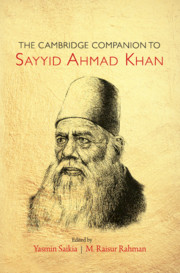Book contents
- Frontmatter
- Contents
- List of Figures
- Notes on Contributors
- Acknowledgements
- A Note on Spellings and Transliteration
- Chronology of Sayyid Ahmad Khan
- Introduction
- Part I Sayyid Ahmad Khan: The rise of a historical figure
- 1 Sir Sayyid on History: The Indian Rebellion of 1857 and Rethinking the ‘Rebellious’ Muslim Question
- 2 Indian Muslims Are the Most Loyal Subjects of the British Raj: Sir Sayyid Ahmad Khan and the Caliphate
- 3 Sir Sayyid on ‘The Present State of Education among Muhammadan Females’
- 4 Naicari Nature: Sir Sayyid Ahmad Khan and the Reconciliation of Science, Technology, and Religion
- Part II Musalman-e Hind: Indian Muslim in a plural environment
- Part III Sir Sayyid today: Enduring legacies
- Conclusion
- Suggested Further Readings
- Index
1 - Sir Sayyid on History: The Indian Rebellion of 1857 and Rethinking the ‘Rebellious’ Muslim Question
from Part I - Sayyid Ahmad Khan: The rise of a historical figure
Published online by Cambridge University Press: 26 April 2019
- Frontmatter
- Contents
- List of Figures
- Notes on Contributors
- Acknowledgements
- A Note on Spellings and Transliteration
- Chronology of Sayyid Ahmad Khan
- Introduction
- Part I Sayyid Ahmad Khan: The rise of a historical figure
- 1 Sir Sayyid on History: The Indian Rebellion of 1857 and Rethinking the ‘Rebellious’ Muslim Question
- 2 Indian Muslims Are the Most Loyal Subjects of the British Raj: Sir Sayyid Ahmad Khan and the Caliphate
- 3 Sir Sayyid on ‘The Present State of Education among Muhammadan Females’
- 4 Naicari Nature: Sir Sayyid Ahmad Khan and the Reconciliation of Science, Technology, and Religion
- Part II Musalman-e Hind: Indian Muslim in a plural environment
- Part III Sir Sayyid today: Enduring legacies
- Conclusion
- Suggested Further Readings
- Index
Summary
INTRODUCING SIR SAYYID
Sayyid Ahmad, in Pierre Bourdieu's term, was a ‘collective individual’ who cannot be encapsulated in a single narrative. We can view his extraordinary life through different lenses, but each lens will seem inadequate. A towering figure revered and held in high esteem by his contemporaries in the late nineteenth century because of his unparalleled Muslim reform work that he undertook singlehandedly; Sayyid Ahmad still looms large in the collective imaginaire of the South Asian Muslims. Postcolonial scholars such as Hafeez Malik, Shan Muhammad, Christian Troll, Aziz Ahmed, and Mushirul Hasan have written extensively on Sayyid Ahmad's reformist activities and accomplishments. Others such as Ayesha Jalal, Francis Robinson, and K. M. Ashraf find in his reformist agenda the source for latter-day Muslim political ‘separatism’ and ‘communalism’, germinating the idea of an exclusive Muslim identity, leading to the creation of Pakistan. By contrast, Ajay Sinha provides a completely different interpretation, qualifying Sayyid Ahmad as a ‘forceful voice in the nationalist struggle against British colonial rule’ and one of the earliest ‘cosmopolitan’ Indians. Such a figure although he can be located in a time and a place is simultaneously beyond the fixed time and a place. He stands as his own evidence of a person who gave shape to a new history and was shaped by the historical structures and events of his time. He is ‘history in person’, in the terms of Holland and Lave, who continuously engaged with context and process creating pathways of new possibilities for self and others. His story inspires us even today.
What would have the Indian Muslims been today without Sayyid Ahmad Khan? This question warrants some reflection, particularly concerning the present day representation of the Muslims as an obscurantist community involved in terrorism and in need of a new makeover. In the late nineteenth century, Sayyid Ahmad Khan launched a community reform movement, which transformed the image of Muslims from violent and rebellious into that of a forward-looking community. By using tools of the British masters – modernization and Western education – Sayyid Ahmad Khan paved a path for a new Muslim future in India.
- Type
- Chapter
- Information
- The Cambridge Companion to Sayyid Ahmad Khan , pp. 17 - 37Publisher: Cambridge University PressPrint publication year: 2019



